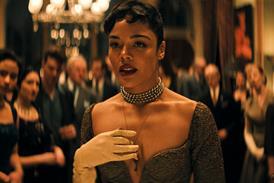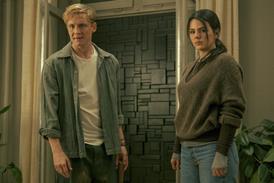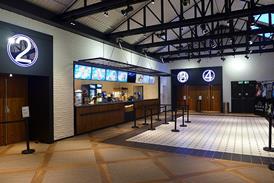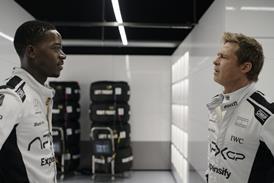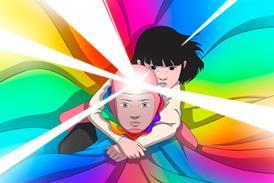Aislinn Clarke follows up The Devil’s Doorway with another atmospheric Irish horror
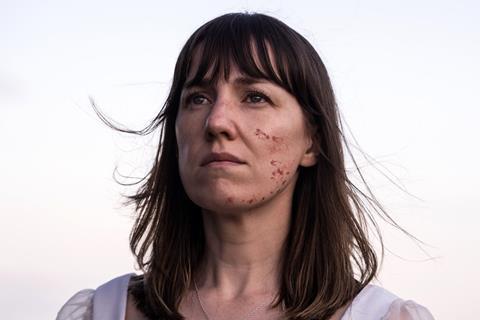
Dir/scr: Aislinn Clarke. Ireland. 2024. 103mins
Fréwaka takes its title from the Irish word “fréamhacha”, meaning roots; fitting for a film contorted by trauma and troubled pasts. If the Irish- and English-language narrative’s twisty nature is close to convoluted in places, this is nevertheless an eerie female-centric addition to the genre. Like writer/director Aislinn Clarke’s 2018 debut horror The Devil’s Doorway, it is likely to travel widely on the festival circuit after premiering in Locarno. Fréwaka will be released in Ireland by Wildcard Distribution, and could easily attract interest in other territories or from a specialist streamer.
An eerie female-centric addition to the genre
A moment from one of those buried histories is revealed in an atmospheric prologue at a 1973 wedding. ’Straw-boys’ – sort of traditional costumed performers – gatecrash the event in disguises, including straw hats that mask their faces, to demand a dance with the bride and groom. A disappearance on this happy occasion will come back to haunt the film. This segment also sets the tone as the straw-boys (plus a goat which becomes a repeated motif) are early nods to the folk horror elements Clarke employs throughout, although she also draws on mental illness and religious iconography. Superstition and delusional thinking are close bedfellows in her hands.
The action moves to the present day where, to the tune of an old Irish ballad, a woman takes her own life. Her daughter Shoo (Clare Monnelly) is a care worker whose reasons for estrangement from her mother will have an increasing impact on her mental state. Engaged to her pregnant Ukrainian fiancee Mila (Aleksandra Bystrzhitskaya), Shoo is grateful to cut short clearing her mother’s house to start a live-in job looking after an elderly agoraphobic in the remote Irish countryside, leaving Mila to continue the pregnancy alone.
The genre staples are soon present and correct. The locals are suspicious and borderline hostile, even when they realise Shoo is an Irish speaker, while her phone inevitably has terrible reception. There’s the elderly pile of a house occupied by the frail but fierce Peig (Bríd Ní Neachtain), overstuffed with taxidermied animals and complete with an ominous red door, wreathed in talismans, that leads to the cellar. Then, not far away, stands a fairy tree – said in mythology to be gateways between the mortal and fairy worlds – hung with tokens.
What makes Clarke’s film interesting is the matter-of-fact tone she initially takes, and the no-nonsense nature of Peig and Shoo’s interactions. The energy that builds between the pair, thanks to top notch performances from Ní Neachtain and Monnelly, recalls the likes of Natalie Erika James’s Relic and Kate Dolan’s You Are Not My Mother, which also let their horror elements blossom from mental disarray.
Peig is scared of things from the other realm, and believes she has good reason. But whatever her underlying delusions, she’s coherent in the moment and up for a fight as she ditches her meds. Shoo is also shown to be a strong character, even when Peig’s paranoia proves to be infectious. As things become slippery, and the various pasts begin to assert themselves in the present, the muscular score from avant-garde Irish performance artist Die Hexen and sound design from Dom Lawrence help to successfully push the atmosphere into full-blown horror territory.
Clarke isn’t quite so successful at juggling her supporting cast. Mila in particular is sidelined early and for so long that our investment in her is lacking when she is called back by the plot demands. The actions of a woman who may or may not be from Shoo’s employer also feel odd, as they briefly take us away from both Peig and Shoo’s perspectives, which largely guide the film, and tip Clarke’s hand somewhat. Nonetheless, the layering of various histories as a way of indicating how trauma can ricochet through generations is ambitiously approached, and the climax enjoyably sinister.
Production companies: DoubleBand Films, Wildcard
International sales: New Europe Film Sales, jan@neweuropefilmsales.com
Producers: Dermot Lavery, Patrick O’Neill
Cinematography: Narayan Van Maele
Production design: Nicola Moroney
Editing: John Murphy
Music: Die Hexen
Main cast: Clare Monnelly, Bríd Ní Neachtain, Aleksandra Bystrzhitskaya, Olga Wehrl





